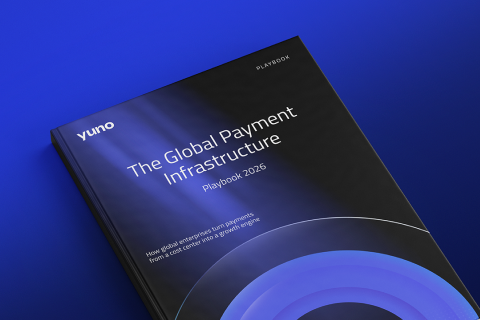Dynamic Routing vs. Smart Routing: definitions, differences, and when to use each

Dynamic Routing and Smart Routing are both ways to decide where a payment should go — but they serve different goals. Dynamic Routing lets you design rules to control providers, fallbacks, and 3DS logic, while Smart Routing uses real-time performance data to automatically pick the best route for each transaction. Understanding when to use each can help you increase approval rates, reduce costs, and scale payments globally.
What is Dynamic Routing?
Dynamic Routing lets merchants configure their ideal path by market, method, and risk controls. Typical setups include provider prioritization, retries, 3DS triggers, and A/B tests to tune cost and performance.
Yuno’s Dynamic Routing product automates payment routing between different providers based on a defined set of rules. For instance, a business can define a payment routing path based on different factors, such as::
- Customer location
- Region associated with the payment method (such as where a credit card was issued)
- Merchant's geographic region
- Available payment methods at the time of purchase
- Customer’s payment preferences
- Bank identification number (BIN) specifics
- Costs and fees associated with different routes
- Real-time availability of financial institutions and Payment Service Providers (PSPs)
With your business strategy in mind, Yuno’s Dynamic Routing directs each transaction through your designed route, improving approval rates, lowering costs, and delivering a smoother payment experience for your customers.
With Yuno’s Dynamic Routing product, businesses can benefit from:
- Higher payment approvals: By allowing the merchant to design payment routes taking into account several factors, Dynamic Routing reduces the likelihood of failed transactions.
- Global reach: Through integrations with over 300 payment methods, Yuno enables businesses to route payments based on a variety of payment preferences and institutions worldwide, giving them access to new markets and geographies.
- Cost efficiency: Businesses are empowered to select the most cost-effective route for each transaction, leading to lower transaction fees and higher profitability.
What is Smart Routing?
Smart Routing uses algorithmic selection to automatically pick the best provider per transaction based on real-time performance benchmarks. At Yuno, Smart Routing is built to raise approval rates at scale and continuously compare acquirers/PSPs — while letting you keep preferred providers when needed.
Key features of Smart Routing
- Intelligent optimization: Smart Routing learns from the performance of various payment providers across Yuno’s database, predicting which one will have the highest approval rates for future transactions.
- Total flexibility: Merchants have full control over how much of their payment traffic is routed through Smart Routing and how much is managed manually.
- Improved conversion rates: By using historical transaction data, Smart Routing significantly increases the chances of successful payments, driving up overall payment conversion rates.
- Reduced manual work: Smart Routing automates the otherwise manual process of analyzing provider performance, freeing up valuable time and resources.
- Operational efficiency: Smart Routing can be customized to prioritize either performance optimization or cost reduction, depending on your business’s specific goals.
Dynamic Routing vs. Smart Routing: Key Differences
While both Dynamic Routing and Smart Routing offer automation and optimization, there are some key differences that set them apart:
When to use each
Use Dynamic Routing when you need control and customization over how transactions flow through different providers. It’s ideal for merchants operating in multiple markets who want to define specific routing rules, manage 3DS behavior, or run A/B tests to balance cost and performance. Dynamic Routing is also a good fit when compliance or local regulations require manual control over routing logic.
Use Smart Routing when you want the system to do the optimization work for you. It’s best suited for businesses processing large payment volumes across regions and providers, looking to maximize approval rates automatically. Smart Routing continuously benchmarks each provider’s performance in real time — ensuring every transaction takes the best possible route without manual intervention.
In most cases, merchants see the best results when both routing methods work together: Dynamic Routing for structured, rule-based control, and Smart Routing for intelligent, data-driven optimization.
Optimize your payments with Dynamic Routing and Smart Routing
Every business has its own set of goals and needs when it comes to optimizing their payments' strategy. That’s why Yuno offers both Dynamic Routing and Smart Routing products to provide you with flexibility and control to design your ideal payment flow. Both solutions enable A/B testing, so you can compare and refine routing strategies for maximum efficiency. However, each option offers distinct advantages.
Our standard Dynamic Routing solution allows you to direct transactions based on a defined set of criteria in order to achieve higher success rates and reduced costs. For a more advanced approach, Smart Routing leverages historical data to make data-driven routing decisions, optimizing each transaction path.
Ready to revolutionize your payment processing? Book a demo and discover how Yuno’s routing solutions can optimize your payment flow today.













